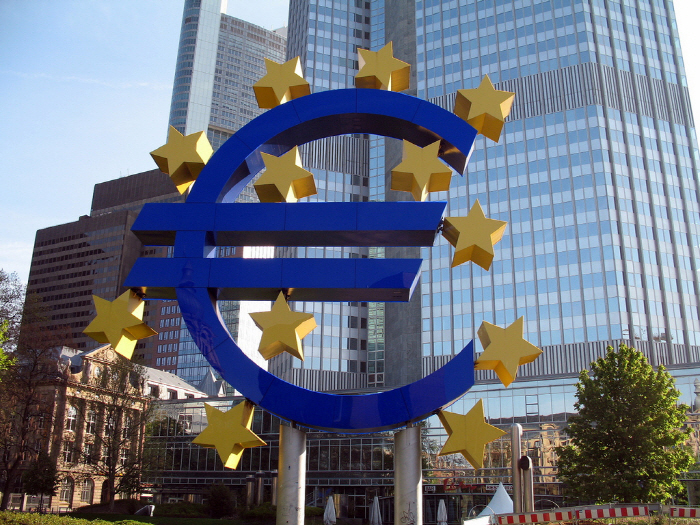For every £2 we send to Brussels, we get £1 back and it comes back with a tag on it on what we have to spend it on.
Gisela Stuart, Labour MP and joint head of Vote Leave, speaking on BBC Radio 4’s Today programme, April 15.
If we left the EU we would take back control over £19 billion which we currently hand over every year – about £350m each and every week.
Michael Gove, justice secretary and joint head of Vote Leave, in a speech on April 19.
When assessing whether these two claims by Vote Leave are accurate, it’s worth remembering that the amount the UK pays into and receives from the EU budget varies year by year. Since the 1980s, the UK has also received a rebate to reduce what was deemed an excessive net contribution to the EU because at the time, we were one of the poorest member states.
By claiming that for every £2 we send to Brussels, we get £1 back, Gisela Stuart is in essence arguing that we pay twice as much into the EU budget as we get back. In 2014 and several other years, this is broadly correct.
In an email to The Conversation, Stuart said that her figures were based on figures in the Office for National Statistics' 2015 Pink Book. That year, the UK’s gross contribution to the EU institutions was £19.1 billion – but EU receipts to the UK amounted to £9.2 billion, “less than half the UK’s gross contribution”.
What’s being counted
But these figures vary from year to year. In 2008, for every £2 the UK contributed, we received about £1.45 back, while in 2013, for every £2 sent we received about £0.74.
There are other complicating factors, mentioned in a recent publication from the Institute for Fiscal Studies. For example, the HM Treasury’s figures include only data that passes through a government agency before reaching the final recipient. So it excludes amounts paid directly to UK recipients, such as universities for research.
Stuart’s observation about money coming to the UK “with a tag on it on what we have to spend it on” is factually correct, but misleading. The money paid out of the EU budget to the member states goes to common EU policies, all of which have been put in place by the member states.
Some money will go to farmers under the Common Agricultural Policy. Other funds will go to Cohesion Policies where, for example, councils have bid successfully for EU funding to support local projects. In Nottingham, for example, EU funding is helping to support the Southern Gateway improvements and the development of the Creative Quarter. Other funds are dispersed for schemes to help job creation, to fund efforts to reduce greenhouse gas emissions, and so on.
So the “tag” which Stuart refers to simply assigns money to the specific projects the EU is helping to fund in the UK, supporting UK agriculture, or regional development.
But it would be an unusual budget where every person, organisation or country got out what they paid in. The EU budget sees richer EU member states being net contributors, and poorer member states being net recipients. This is a basic principle of re-distributive budgets.
How much per week?
Another figure that is being repeated by Vote Leave campaigners is that the UK sends £350m a week to Brussels.
The way in which the UK’s EU budget rebate works means that the figures that Gove cited are incorrect – even though in his speech he did go on to mention the UK’s rebate. First, our payments are not over £19 billion. Data from HM Treasury confirm the figure to be £18.8 billion. Second, this figure is the highest ever figure, rather than what we contribute “every year”.
Third, the Treasury report shows forecasts from the Office for Budget Responsibility predicting that only in three of the coming six years will our gross contribution be above £19 billion. This is neither a common figure, nor part of a rising trend.
When Gove said “the amount we give to the EU is due to go up – and up – and up”, he is ignoring the detailed evidence to the contrary provided by the Office for Budget Responsibility.
So the £350m figure is simply wrong. Looking at 2014 data, the only year where payments into the EU budget have come close to £19 billion, dividing that figure by 52 weeks gives £350m. Yet the UK’s contributions to the EU Budget are reduced by the rebate. This reduces the figure to £280m – so Gove has exaggerated the actual figure by 25%.
Verdict
While Gisela Stuart’s claim that for every £2 put in, the UK gets £1 is partially true, if based on 2014 figures – and the amount does vary year by year. Michael Gove’s reassertion that the UK is paying £350m a week to Brussels omits the rebate the UK receives on its contribution to the EU budget. His assertion that our contribution is going to go up and up and up is contradicted by research from the Office of Budget Responsibility.
Beyond this, such a focus on these numbers fails to put into context the small scale of EU budget transfers, when compared with UK national expenditure. UK total managed expenditure in 2013-14 was £714 billion, and in 2014-15 £732 billion. So the UK’s net contribution to the EU budget is thus less than 1.5% of total government spending.
Review
Peter Holmes, Reader in Economics, University of Sussex
The fact check broadly supports the claim that in the past, the UK has received £1 for every £2 sent to Brussels. But most other analysts have concluded that this – and the claim that the UK sends £350m a week to Brussels – is not the best way to present the figures.
The £19 billion figure used to make these calculations does not take account of the rebate negotiated by Margaret Thatcher in 1984. As the Daily Telegraph put it: “In fact, the rebate is effectively deducted at source, and so not actually sent to the EU at all.” Therefore, the UK actual transfer to Brussels in 2014 was not £19.234 billion but £14.346 billion, according to a House of Commons briefing published in February 2016.
Even if one accepts that the receipts from the EU were around £9.2 billion (which excludes some payments not passing through the Treasury) the UK receives £1 for every £1.55 it actually pays.
 Peter Holmes is a member of the Labour party.
Peter Holmes is a member of the Labour party.
Robert Ackrill does not work for, consult, own shares in or receive funding from any company or organization that would benefit from this article, and has disclosed no relevant affiliations beyond the academic appointment above.
Robert Ackrill, Professor of European Economics and Policy, Nottingham Trent University
This article was originally published on The Conversation. Read the original article.




 Australia’s December Trade Surplus Expands but Falls Short of Expectations
Australia’s December Trade Surplus Expands but Falls Short of Expectations  Trump Lifts 25% Tariff on Indian Goods in Strategic U.S.–India Trade and Energy Deal
Trump Lifts 25% Tariff on Indian Goods in Strategic U.S.–India Trade and Energy Deal  Thailand Inflation Remains Negative for 10th Straight Month in January
Thailand Inflation Remains Negative for 10th Straight Month in January  Asian Stocks Slip as Tech Rout Deepens, Japan Steadies Ahead of Election
Asian Stocks Slip as Tech Rout Deepens, Japan Steadies Ahead of Election  Trump Endorses Japan’s Sanae Takaichi Ahead of Crucial Election Amid Market and China Tensions
Trump Endorses Japan’s Sanae Takaichi Ahead of Crucial Election Amid Market and China Tensions  Dollar Near Two-Week High as Stock Rout, AI Concerns and Global Events Drive Market Volatility
Dollar Near Two-Week High as Stock Rout, AI Concerns and Global Events Drive Market Volatility  Japanese Pharmaceutical Stocks Slide as TrumpRx.gov Launch Sparks Market Concerns
Japanese Pharmaceutical Stocks Slide as TrumpRx.gov Launch Sparks Market Concerns 































